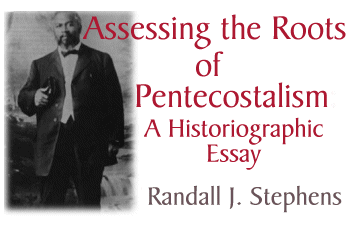Pentecostalism is arguably the most important mass religious movement of the twentieth century. Today, this movement is the second largest sub-group of global Christianity. It has over 30 million American adherents and a worldwide following of 430 million.1 Pentecostalisms inauspicious beginnings at the turn of the century make the movements growth all the more surprising. This essay will examine how historians have interpreted the origins of American Pentecostalism and will suggest some areas for further study. Before discussing the historiography, it will help to survey the movements early history.
Pentecostalism grew out of the Holiness revival during the second half of the nineteenth century. This revival was an expression of both social and theological discontent among the nations lower and middle-class groups. Holiness advocates disapproved of the impiety in mainline denominations and were alienated by the growing wealth and elaborateness of their churches. Not content to remain in mainline churches, they formed new religious communities committed to the theological doctrine of perfectionism.2 These former Methodists, Presbyterians, and Baptists believed they were experiencing a renewed outpouring of the Holy Spirit much like the early church experienced in the book of Acts. The holiness revival spawned zeal for "Spirit Baptism" (a divine empowerment of believers) and for other gifts of the New Testament church such as healing and prophecy. Holiness leaders such as Charles Cullis, John Alexander Dowie, and Albert B. Simpson established healing missions across the U.S. They, like other holiness advocates, believed a new, miraculous era of the spirit was occurring which would end in the second coming of Christ.
Pentecostalism took "Spirit Baptism" and the restoration of New Testament gifts one step further. In January, 1901, holiness minister Charles Fox Parham asked the students at his Topeka Bible school to study the scriptures and determine what evidence might be given of Spirit baptism.
Using the pentecost account in Acts chapter two, they concluded that speaking in tongues was the confirmation of Holy Spirit baptism. This first wave of Pentecostalism spread in the revival that followed, but remained regional, moving into Kansas, Missouri, Texas, and Arkansas.
ASSESSING THE ROOTS
[examination of the supposed Biblical FOUNDATION of this movement in
Acts 2, PENTECOST can determine whether the entire house is built on the right The Foundation, or if there is error.....please contribute here re: the Miracle of Pentecost as recorded in Acts 2]


